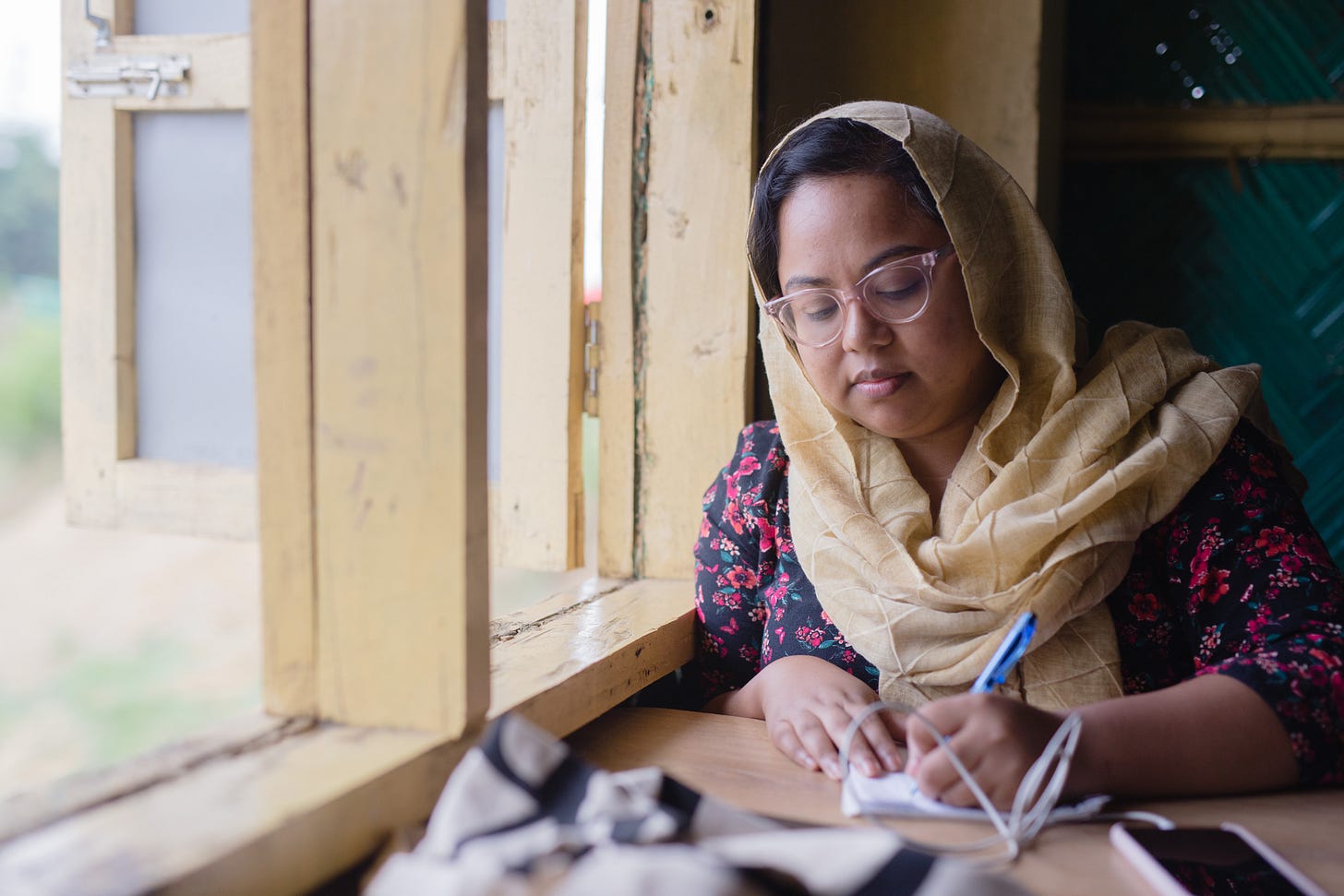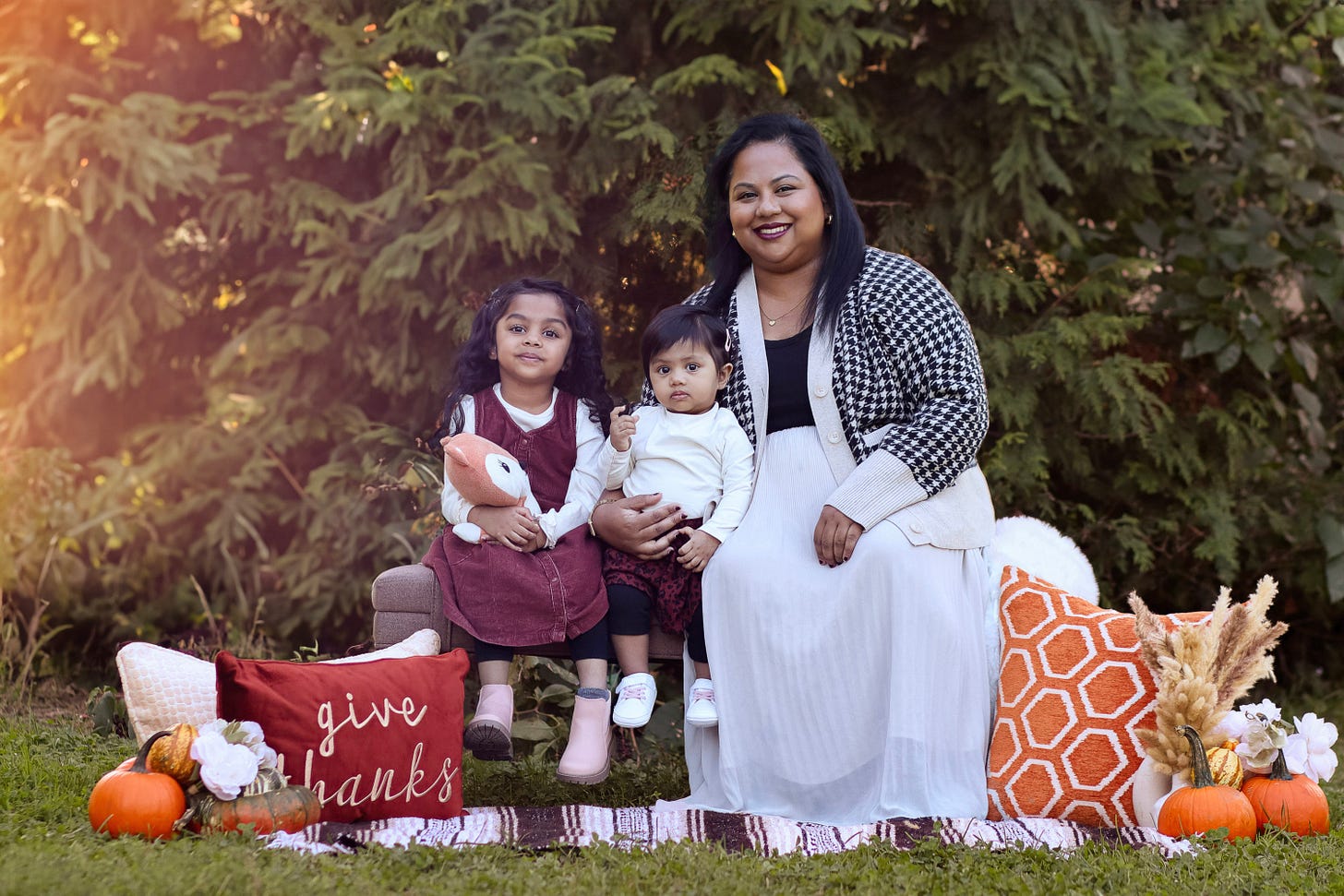Reporting from Refugee Camps Shaped Me, Pandemic Motherhood Strengthened Me
Here's why I need your support for Port of Entry + a new feature
Five years ago, I was crouched in Bangladesh's refugee camps, notebook in hand, documenting the largest refugee crisis of the last decade. The Rohingya story captivated global headlines, but so much remained untold. Between interviews with refugees, I was investigating Bangladesh's garment industry, uncovering the routine harassment women workers faced daily.
Then March 2020 happened. One day I was filing stories from refugee camps and the next, well, the world shut down because of COVID-19, and so did my life as I knew it. I discovered I was pregnant on March 12th, the day after The World Health Organization officially declared COVID-19 a pandemic and three days before my birthday.
Motherhood in a pandemic forced me to rethink everything. Field reporting as an independent journalist? Financially impossible and logistically nightmarish. So I pivoted to advocacy communications at the Center for Reproductive Rights, where my team sounded the alarm about America's reproductive rights rollback—a regression now reverberating globally.
This isn't just my personal experience, the world as we know it has exponentially changed. We're approaching the five-year mark since COVID upended everything. Trump has returned to office. International aid is being slashed—Rohingya refugees now survive on food rations cut from $12.50 to just $6 daily. And women's rights? They're eroding faster than coastlines in a climate crisis—both here and abroad.
My reporting has always lived at the intersection of women's issues, human rights, and immigrant communities. Now, raising two daughters as the child of formerly undocumented immigrants, these stories aren't just assignments—they're personal.
That's why I launched Port of Entry.
Legacy media has never fully invested in these narratives, and now, with newsrooms shuttering and corporate media bowing to political pressure, independent journalism matters more than ever. From documenting my mother's journey as a child bride to breaking the story of a South Asian American woman charged with feticide for NBC News; from uncovering sexual violence against Rohingya widows to reporting on Pro-Palestinian advocates facing workplace repercussions—I've reported all of these as an independent journalist.
I'm building Port of Entry as a launchpad for the reporting that matters to me and hopefully to you. But with a crucial difference: I practice what assistant professor of journalism at the University of Texas, Austin Anita Varma calls "solidarity journalism." Rather than just documenting problems, we focus on solutions and center the agency of the communities we cover. Port of Entry isn't about extractive storytelling or poverty porn, it's about highlighting resilience and concrete paths forward while standing in solidarity with affected communities.
Through personal essays, investigations, and interviews, I'm covering stories that rarely make mainstream headlines, always with an eye toward solutions that empower rather than narratives that simply evoke pity.
Join The Mission: Making Independent Journalism Sustainable
You'll still see my bylines in major outlets (and hopefully some collaborations) because these stories deserve the widest possible audience but the beauty of Port of Entry is I don't have to convince an editor who has little insight into underrepresented communities why these stories matter.
But I can't do this alone.
This is my first direct appeal to you. I want to keep this newsletter free because paywalls don't serve the communities I write about. But I need your support:
If you're a free subscriber, consider upgrading to a paid subscription—for $6/month, $60/annually or $100/founding member.
If you prefer to make a one-time contribution, you can do that here.
If financial support isn't possible, sharing this newsletter helps tremendously. Forward this newsletter to friends or share on social media.
Thank you for reading, for being here, and for supporting journalism that refuses to be silenced.
INTRODUCING POLICY WATCH
I've been thinking about how I can better serve you, my readers. This community cares deeply about what happens to immigrants, refugees, and other marginalized groups. So starting now, every newsletter will include a "Policy Watch" section, updating you on a single federal, state, or international policy each week that threatens communities of color, immigrants, refugees and other vulnerable populations.
Republicans Reintroduce SAVE Act: A Voter Suppression Tactic That Targets the Most Vulnerable
Republicans in Congress have reintroduced the SAVE Act, which would require Americans to prove citizenship when registering to vote or updating their registration. They claim it prevents non-citizen voting (which is already illegal), but let's be real: this creates massive barriers for eligible voters.
Over 140 million Americans don't have passports. Nearly 70 million women who've taken their spouse's name lack birth certificates matching their current legal names. This legislation would cripple most voter registration methods and hit hardest those already facing systemic barriers: naturalized citizens, communities of color, women, seniors, and low-income voters.
What You Can Do
Congressional Democrats have countered by reintroducing the John R. Lewis Voting Rights Advancement Act, which would restore crucial protections against discriminatory voting laws that were gutted by the Supreme Court. The bill would reinstate the preclearance system, requiring federal review of any changes to voting laws in areas with a history of discrimination, ensuring that laws like restrictive voter IDs or polling place closures don't unfairly impact voters of color. It also strengthens Section 2, allowing voters to challenge discriminatory laws in court. As lawmakers like Rep. Rashida Tlaib push to protect voting rights, consider supporting their efforts by learning more and adding your name to initiatives aimed at safeguarding access for all eligible voters.



